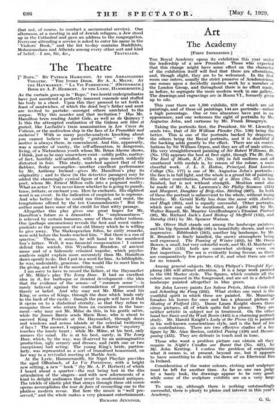The Theatre
[" /WIPE." BY PATRICK HAMILTON. AT THE AMBASSADORS THEATRE. " THE IVORY DOOR. BY A. A. MII1sTE. AT THE HAYMARKET. " LA VIE PARISIENNE." (OFFENBACH.) Boox nv A. P. HERBERT. AT THE LYRIC, HAMMERSMITH.] As the curtain goes up in " Rope," two horrid undergraduates have just murdered a perfectly innocent comrade and stuffed his body in a chest. Upon this they proceed to set forth a feast of sandwiches, of which the dead boy's father and aunt are invited to partake—amongst others unrelated to the corpse. Why this murder and that invitation ? Has Mr. Hamilton been reading Andre Gide, as well as de Quincey ? Is this the attempted realization of the Gidean acte Libre et gratuit, like Lacfadio's train -assassination in Les Caves du Vatican, or the motiveless slap in the face of Le Promithee mar enchaine ? With so many psycho-analysts knocking about you cannot believe in purely " gratuitous " crime : the motive is always there, in concealment. And this, apparently, was a murder of vanity, the self-affirmation, in dangerous, living, of a Nietzschean youth whom Mr. Brian Aherne shows, I think, just as he may 'somewhere exist—coldly polite, matter- of fact, horribly self-satisfied, with a prim mouth suddenly distorted in fear. This study, matched against that of the
flabbier, - fleshy accomplice another excellent performance by Mr. Anthony Ireland—gives Mr. Hamilton's play its originality ; and to these (in the detective passages) may be added the charmingly cynical figure of the crippled detective poet, whom Mr. Ernest Milton calls into a poignant reality. What an actor ! You never know whether he is going to puzzle, tease, irritate, or enchant you. Here he enchants. His shghtest word is an event. In the indication of suspicion he is supreme. And who better than he could run through, and resist, the temptations offered by the ten Commandments ? But the author must have some of the credit for that witty passage.
Altogether this play gives one great hopes for Mr. Hamilton's future as a dramatist. Its " unpleasantness " is relieved by certain humours, some of them rather tedious. One (perhaps unconscious) reveals the first and worst under- graduate as the possessor of an old library which he is willing to give away. The. Shakespearian folios, he airily remarks, were sold before the books reached him. "But there is a run of quartos." These, it seems, he will hand to the murdered boy's father. Well, it was financial compensation ! I cannot defend this wretch, this Wyndham Brandon, of ancient name and of a hideously criminal impulse, which, psycho- analysis might explain more accurately than Mr. Hamilton dares openly to do. But I put in a word for him. As bibliophile, he was, undeniably, generous. One would like to meet him in the giving, and not in the murdering, vein. . I am sorry to have to record the failure, at the Haymarket of Mr. Milne's play The Ivory Door. It had an excellent idea in it, for burlesque or ironical development—the idea that the evidence of the senses—of " common sense "—is rarely believed against the contradiction of preconceived theory or belief. And why may not Mr. Milne send his King, or series of Kings, through the door which leads only to the back of the castle ; though the people will have it that it opens on to a diabolical eternity, so that they refuse to recognize those who return from an excursion in the base- ment—why may not Mr. Milne do this, in his gentle satire, while Sir James Barrie sends Marie Rose, who is about to succeed King Perivale at the Haymarket, through doors and windows and across islands at the celestial twittering of fays ? The answer, I suppose, is that a Barrie " mystery ' touches the lonely heart ; while Mr. Milne, at his best, only amuses the mind. He is at his best, surely, in The Ivory Door, which, by the way, was ill-served by an unimaginative production, ugly scenery and dresses, and (with one or two exceptions) bad acting. The young King's bride, particu- larly, was represented as a sort of transfixed housemaid, on her way to a revivalist meeting at Marble Arch. At the Lyric, Hammersmith, Sir Nigel Playfair provides the aged Offenbach, of La Vie Parisienne, with a bright new setting, a new"" book " (by Mr. A. P. Herbert) of which I heard about a quarter—the rest being lost in the dim articulation of the singers—and with new adornments of a kind to delight audiences that revel in modernized antiques. The trickle of idiotic plot that strays through these old comic operas accomplishes the tour de force of reconciling one to the plotless modern revue. But here 'the music is "well pre- served," and the whole makes a very pleasant entertainment.
RICHARD JENNINGS.






















































 Previous page
Previous page